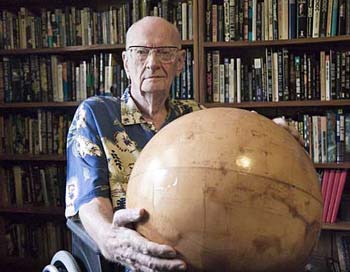asks science fiction writer Arthur C. Clarke, in a short essay from 1992

There are two aspects to the search for extraterrestrial intelligence - the technological aspect, and the philosophical aspect. The first is expressed in the concern of engineers and scientists: how and where to search and with what equipment? The second aspect - the concern of every thinking person, because it deals with one of the basic questions that a person can ask: What is the position of the person in the cosmic operating instructions?
The spectrum of possible persuasive answers is very wide, and it has provided many science fiction writers. However, they usually dealt with contact rather than some other kind of discovery. A spaceship landing on the White House lawn is certainly more exciting than a collection of whispers and disturbances that will be gathered by hearing rather than by sight, although such a scenario is more likely.
Whatever form it takes, the discovery of intelligent life outside of Earth will forever change our view of the universe. At the very least, he will prove to us that reason has survival value, despite what we see on the evening news. I suspect that the first thing we would like to know about those islands. T.-im is "how do they look?". This question can be answered easily, if we receive video signals (which should not be difficult, when the principles involved are universal). Almost certainly going into shock. Although our basic design appears to be an efficient one, which may appear frequently on Earth-like planets, nowhere in the galaxy will there be creatures that we could confuse with ordinary humans, except, perhaps, on particularly dark nights.
We are the end product of countless throws of genetic dice. Never in all time and space can the exact evolutionary order return. From an engineering point of view, for example, monkeys and humans have the same structure, yet we do not confuse them. Even an island. T. A humanoid would look weirder than, say, a gorilla. They are more likely to be alien in appearance than an octopus, a mantis, or a dinosaur.
This is perhaps the reason why many people oppose the Seti project. Perhaps according to their logic, it is ticking like a time bomb in the screen of our pride - and that of many of our religions.
Supporters of the search are hoping for big returns. If there is a high civilization somewhere along the milk path, perhaps it is broadcasting some kind of coded "Encyclopedia Galactica" for the benefit of their less developed neighbors. Perhaps such an encyclopedia will contain answers to the questions that our philosophers and scientists have asked themselves for centuries, and solutions will be found to many of the practical problems humanity is grappling with.
But can we digest this flood of knowledge? And won't his very presence make us feel terminally inferior? Even the most carefully planned encounters between cultures at different levels of development can be disastrous. Is it not better for us, in the long run, to discover this knowledge by our own means. It's like the story of a chief of a primitive tribe, who is thrilled by Western technology and says in response: "You stole our dreams."
Despite everything, I believe that Seti's promise is far greater than its danger. It presents the greatest possibility of discovery, and when we stop exploring, we stop being human.
But maybe all the debate about Seti is unnecessary, and intelligent life only developed on Earth. This, of course, would be impossible to prove, because there could always be some island. T. Beyond our scope. If, however, after hundreds of years of listening and watching, no sign of extraterrestrial intelligence is found, we can judge with certainty that we are alone.
And this is the most awe-inspiring possibility. We are just beginning to appreciate our responsibility to planet Earth. If indeed we are the remaining souls in our galaxy, we must be its guardians in the future as well.
Arthur C. Clark was known both for his science fiction writing, and for his scientific writing (remember, he is the one who invented the communication satellites). Clark serves as the head of the International Space University in Colombo, Sri Lanka. Among his most famous books: "The End of Childhood", and "2001 Space Odyssey".
